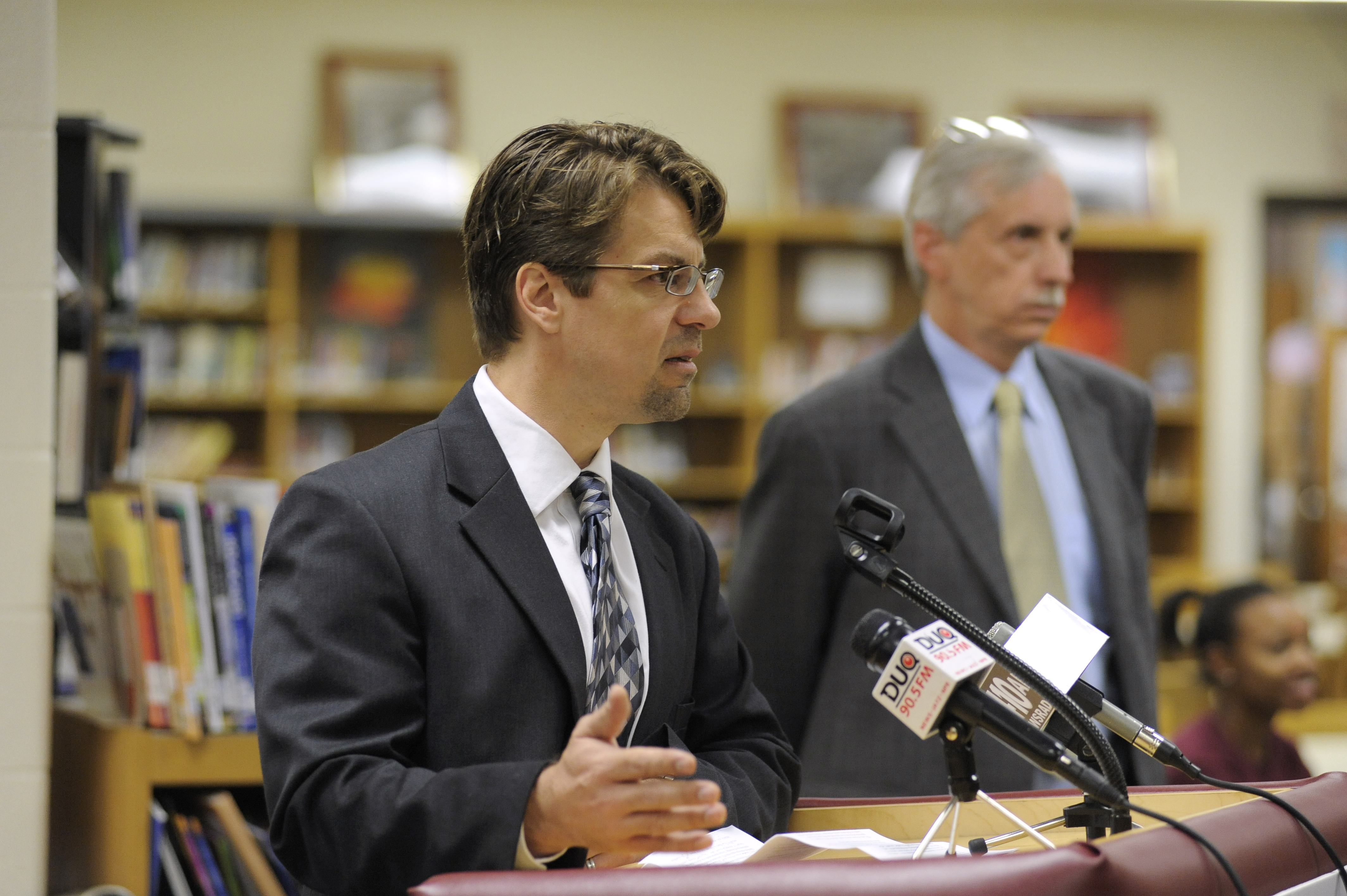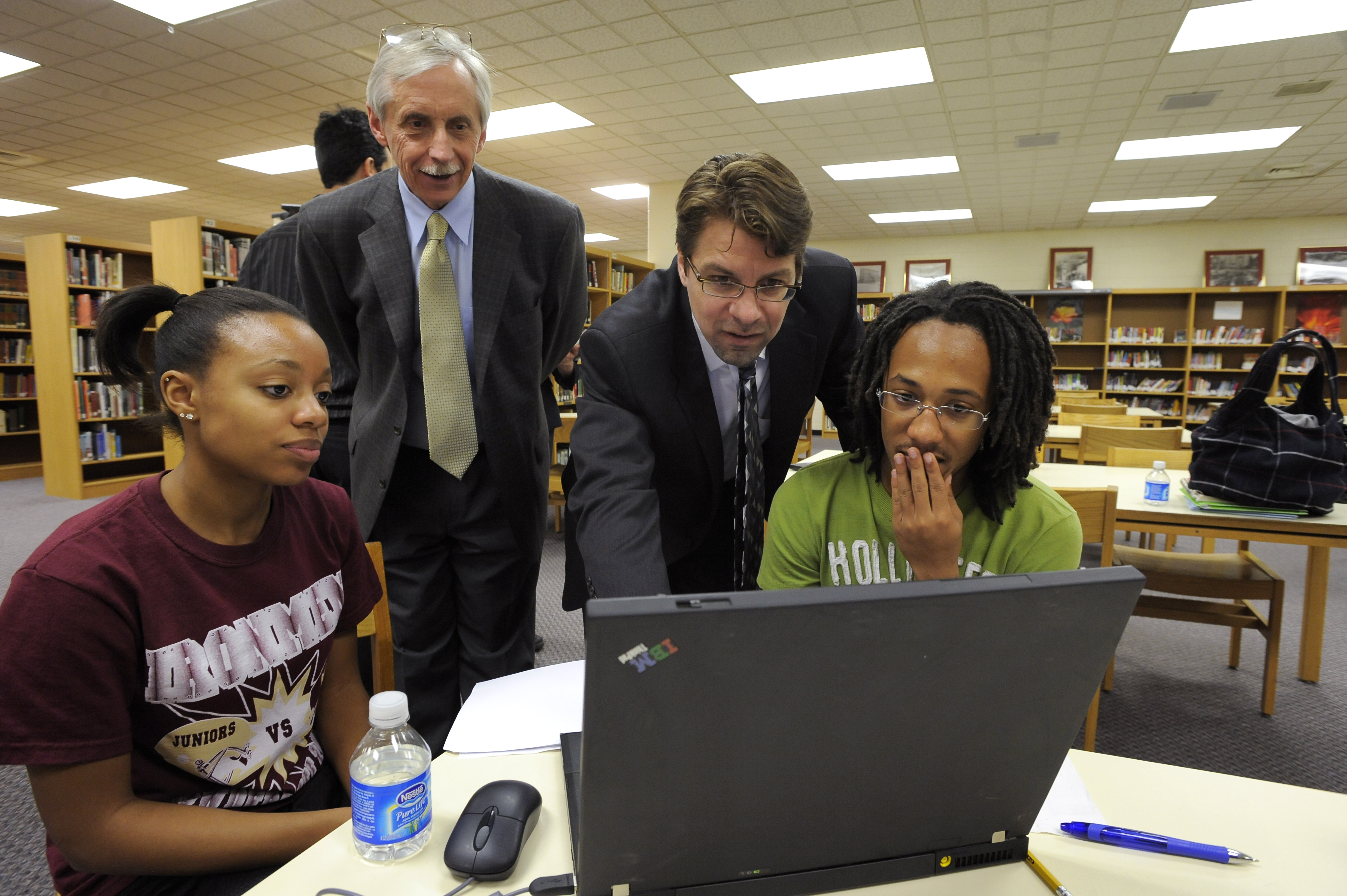NSF Renews Pittsburgh Science of Learning Center With $25 Million Grant
Byron SpiceThursday, May 14, 2009Print this page.

New!Podcast now available
PITTSBURGH - The National Science Foundation has renewed a five-year, $25 million grant to continue the work of the Pittsburgh Science of Learning Center (PSLC), founded by Carnegie Mellon University and the University of Pittsburgh in 2004 to study how people learn and how to use those findings to develop teaching tools that can foster consistently high achievement in the nation's classrooms.
Unlike most scientific research on learning, which occurs in the laboratory, the PSLC conducts its research in the classrooms of more than 50 schools and colleges across the country, including schools in New York City, Pittsburgh, Miami, Omaha and Seattle.
These schools comprise what the PSLC calls LearnLab. Much as teaching hospitals help medical schools explore the frontiers of medicine to the benefit of patients, LearnLab enables education researchers to see how students respond to lessons and innovations in a place better than any laboratory - in their own classrooms with their own teachers.
"We're exploding an old Catch-22 in education research: that is, results of experiments done in laboratories don't translate well into school environments and the results of experiments done in schools generally aren't rigorous or trustworthy enough to pass on to others", said Kenneth Koedinger, professor of human-computer interaction at Carnegie Mellon and co-director of the PSLC with Pitt's Charles Perfetti.
This research can occur without disrupting the classroom thanks to the use of computer tutors. Working in partnership with Carnegie Learning Inc., whose Cognitive Tutor® math software already is in use in thousands of schools nationwide, PSLC researchers are able to gather mountains of detailed information about how students respond to lessons and homework. Subsequent analysis of this data helps researchers understand the different learning styles and habits of students and identify those lessons that are most effective in helping students learn.
"We are trying to uncover deep principles that produce learning that is robust - learning that is long-lasting and applicable to new situations," said Perfetti, Distinguished University Professor of Psychology and director of Pitt's Learning Research and Development Center (LRDC).
The computer tutors cover a range of subjects, such as algebra, geometry, physics, chemistry, Chinese and English as a second language. But the PSLC researchers have gone beyond these standard subjects to include tutoring on lifelong learning skills. For instance, they've developed a help-seeking tutor that interacts with the Carnegie Learning® Geometry Cognitive Tutor®. The help-seeking tutor determines whether students fail to ask for help appropriately or are too quick to ask for help by machine analysis of their normal learning interactions.
"We have demonstrated in a randomized, controlled 'in vivo' experiment that the help-seeking tutor leads to lasting effects," Koedinger said.
Eventually, PSLC research might lead to the demise of what students have long dreaded - the test. Computer tutors, they have found, can constantly assess what a student has and hasn't learned and even suggest exercises to improve areas of weakness, Koedinger said.
"In other words," he said, "we do not need to interrupt students to give a test in order to find out what their learning strengths and weaknesses are."
The PSLC is continuing a tradition of innovative education research, combining the strengths of Carnegie Mellon and Pitt in cognitive and developmental psychology, human-computer interaction, intelligent tutoring systems, machine learning and language technologies.
At Pitt, LRDC founding director Robert Glaser and past director Lauren Resnick established programs of learning research and instructional development as twin pillars of educational innovation. At Carnegie Mellon, in the 1990s, Professor John R. Anderson, a psychologist and computer scientist, led a team, including Koedinger, which created an intelligent computer tutor to teach algebra to high school students. The program actually thought like a teenager and was so successful that Carnegie Learning was spun out to develop computer tutors as a commercial product.
"The work of the PSLC is critical and very timely as we re-evaluate effective education in the United States," said Steve Ritter, co-founder and chief scientist at Carnegie Learning. "Improving student performance, particularly in math and science, is more than a social initiative, it's a national economic agenda as we strive to compete in a global economy by arming our students with 21st century learning skills."
Carnegie Learning, Inc. assists PSLC researchers with running experiments using its Cognitive Tutors and with collecting and analyzing data from student use of the systems. As part of the grant renewal, the company has committed to working with researchers to analyze data from more than 100,000 students, representing a broad cross-section of student background and ability.
"Vast, new data sources have driven scientific innovation from physics to medicine," Koedinger said. "We are now doing just that to understand how people learn. Researchers are using the detailed data collected by educational technologies to explore changes in student thinking and how to make learning faster, better and more pleasurable."
Pittsburgh Science of Learning Center
By the numbers
100,000 ' approximate number of hours of data on student instruction available for analysis in the PSLC's repository, known as DataShop. Also the approximate number of lessons completed by students to date.
453 number of researchers who use DataShop.
17 number of countries whose researchers use DataShop. In order of number of users: United States, Germany, Spain, Israel, Canada, Greece, France, Mexico, Japan, Belgium, Philippines, Taiwan, Italy, Korea, Poland, Chile, Brazil.
4,105 - number of K-12 students participating in PSLC studies in the 2007-2008 academic year.
145 number of "in vivo" studies conducted in first four years of LearnLab operation, as part of 84 research projects.
62 number of K-12 teachers participating in PSLC studies in 2007-2008. Also, the number of researchers running PSLC studies that academic year.
565 - publications in the PSLC's first four years, including 86 journal articles, 37 book chapters, 30 invited talks
9 - number of partner universities with active research projects in the PSLC, including Arizona State University, University of California, Berkeley, University of California, Santa Barbara, San Diego State University, University of Freiburg, University of Saarland and SUNY, Queens College.
More than 50 schools and universities have participated in PSLC studies over the past five years, including sites in Los Angeles, New York, Hong Kong, Seattle and Miami. Participating schools and colleges in Pennsylvania have included:
- Community Day School, Pittsburgh
- Delaware Valley Friends School, Paoli
- Greenville High School
- Hampton High School, Allison Park
- Middlesex School, Concord
- North Hills Jr. High School
- Riverview Jr/Sr High School, Oakmont
- Saltsburg High School
- Steel Valley School District, Munhall
- The Hill School, Pottstown
- Wilkinsburg High School
- Gettysburg College
- Grove City College
- Penn State University, State College
- Penn State'Erie
- Saint Vincent College
- University of the Sciences, Philadelphia
- Washington & Jefferson College, Washington
Schools and Universities that have participated as research sites for the Pittsburgh Science of Learning
- Arizona State University, Phoenix, AZ
- Carl Albert State College, Poteau, OK
- CMU - Chemistry LearnLab, Pittsburgh, PA
- CMU - Chinese LearnLab, Pittsburgh, PA
- Defense Language Institute, Monterey, CA
- Delaware Technical and Community College, Delaware
- E Tennessee State University, Johnson City, TN
- Freiburg University, Freiburg, Germany
- Gettysburg College, Gettysburg, PA
- Grove City College, Grove City, PA
- Kazakhstan University, Kazakhstan
- Penn State University, State College, PA
- Penn State Erie, Erie, PA
- Rochester Institute of Technology, Rochester, NY
- Saint Vincent College, Latrobe, PA
- S. Denmark University, Denmark
- University of California, Berkeley, Berkeley, CA
- United Nations, New York, NY
- University of British Columbia, Vancouver, Canada
- University of Hawaii, Manoa, HI
- University of Illinois at Chicago, Chicago, IL
- University of Louisville, Louisville, KY
- University of Michigan, Ann Arbor, MI
- University of N. Florida, Jacksonville, FL
- University of Pittsburgh, Pittsburgh, PA
- University of Rochester, Rochester, NY
- University of the Sciences, Philadelphia, PA
- University of Virginia, Charlottesville, VA
- US Naval Academy, Annapolis, MD
- Vassar College, Poughkeepsie, NY
- Washington & Jefferson College, Washington, PA
- Washington and Lee University, Lexington, VA
- Community Day School, Pittsburgh, PA
- Delaware Valley Friends School, Paoli, PA
- Doral Academy Charter Middle School, Miami, FL
- Fieldston Upper School, Bronx, NY
- Greenville High School, Greenville, PA
- Hampton High School , Allison Park, PA
- Holy Trinity Episcopal Academy, Melbourne, FL
- Hong Kong International School, Hong Kong
- Los Angeles Unified School District, Los Angeles, CA
- Middlesex School, Concord, PA
- New Bright Future School, Omaha, NE
- North Brunswick High School, N. Brunswick, NJ
- North Hills Jr. High School, Pittsburgh, PA
- North Plainfield High School, N. Plainfield, NJ
- Northwest School, Seattle, WA
- Overland High School, Aurora, CO
- Passaic Valley High School, Little Falls, NJ
- Ramsey High School, Bergen, NJ
- Riverview Jr/Sr High School, Oakmont, PA
- Saint Xavier High School, Cincinnati, OH
- Saltsburg High School, Saltsburg, PA
- Steel Valley High School, Munhall, PA
- Steel Valley Middle School, Munhall, PA
- Steel Valley School District elementary schools, Munhall, PA
- Stoughton High School, Stoughton, MA
- Summerlin Academy, Bartow, FL
- The Hill School, Pottstown, PA
- Watchung Hills Regional High School, Warren, NJ
- West Orange High School, West Orange, NJ
- Wilkinsburg High School, Wilkinsburg,
About Pitt's Learning Research and Development Center (LRDC): For four decades, LRDC scholars have researched learning and instruction in a number of disciplines with the aim of advancing education and training. The Center's mission is both to conduct world-class research on teaching and learning, and to apply what is learned with collaboration from education practitioners, business and government enterprises, and non-profit organizations to improve instruction and learning in schools, museums, universities, and workplaces. LRDC's research portfolio includes large programs of extended duration as well as single-investigator projects of a smaller scope. Research activities are organized within general thematic categories of learning and teaching, including cognitive neuroscience, math and science, reading and language, learning technology, social and affective factors in learning, and refining school practices, among others.
About Carnegie Learning, Inc.: Carnegie Learning, Inc. is a leading publisher of research-based math solutions for middle school, high school, and post-secondary students. Our curricula - Bridge to Algebra, Algebra I, Geometry, Algebra II, and Integrated Math programs - provide differentiated instruction to 500,000 students in nearly 2,600 schools across the United States, helping them to succeed in math as a gateway to graduation and preparation for 21st century skills. Carnegie Learning® Blended Math Solutions integrate interactive software, text and collaborative classroom activities for core, full-year math instruction. Carnegie Learning® Adaptive Math Solutions feature Cognitive Tutor® Software lessons that are easily customized for supplemental and Response to Intervention programs. All solutions are supported by Professional Development services that ensure successful implementation and align teaching to learning. In numerous independent studies, Carnegie Learning® Curricula consistently show a significant effect on student learning resulting in improved academic achievement in mathematics. More information.


Byron Spice | 412-268-9068 | bspice@cs.cmu.edu
